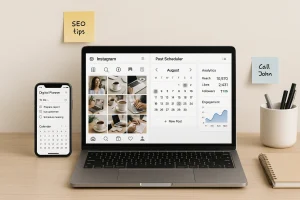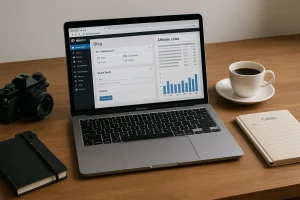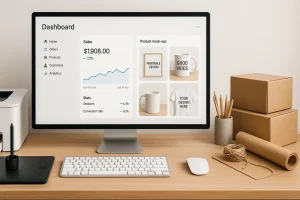Top 10 Low-Cost Business Ideas with High Profit

Is it realistic to start a business in the UK without investing thousands of pounds? Can a small venture launched from home grow into a sustainable, high-income source? More people than ever are asking these questions as they search for flexible ways to increase their income, especially in a challenging economic environment.
The truth is, starting a business doesn’t always require large capital or complicated logistics. With the right idea, skills, and digital tools, it’s possible to build a profitable venture with minimal investment. This guide explores ten of the best low-cost business ideas that offer high earning potential in the UK, along with who can benefit from them and why they work in today’s climate.
Why Start a Low-Cost Business in the UK?
Starting a low-cost business has never been more appealing. As living costs rise and traditional job structures evolve, people across the UK are turning to small business ownership not just as a side hustle, but as a primary source of income.
The country’s digital infrastructure, widespread internet access, and a growing freelance economy make it easier than ever to start a business from your home, a co-working space, or even a mobile setup.
For many aspiring entrepreneurs, the biggest obstacle is the assumption that starting a business requires significant financial investment. However, thousands of successful UK businesses today began with as little as £100 or less. What they had in common was a strong understanding of customer needs, efficient use of digital platforms, and a commitment to building something valuable.
In addition to low overhead costs, starting a business in the UK can benefit from free online resources, accessible government guidance, and community-led support through incubators and networking groups. Whether one aims to work part-time, full-time, or simply test the waters, a low-investment business is a practical and low-risk way to get started.
What Makes a Business Both Low-Cost and High-Profit?

The most successful low-cost businesses share a few key traits. They require little to no physical inventory, use existing platforms to reach customers, and leverage the owner’s personal skills rather than expensive tools or locations. Typically, these businesses are service-based, digital-first, and highly adaptable.
The profit margin for these ventures tends to be high because fixed costs are minimal. For example, a freelance writer offering services online doesn’t need office space, expensive tools, or stock. Their main investment is time and expertise, and they can generate significant income once they secure a client base.
Digital scalability is another major advantage. Once a digital product or online service is set up, it can reach a broad audience with very little additional cost. This makes the profit potential especially appealing compared to traditional bricks-and-mortar businesses.
Here’s what defines a low-cost, high-profit business:
- Startup cost under £500
- Fast time-to-profit (within weeks or months)
- Ability to operate from home or online
- Scalability without large reinvestment
- Minimal licensing or regulatory overhead
In short, these businesses offer an ideal blend of affordability and growth potential, a win-win for entrepreneurs just getting started.
Who Can Benefit from Starting a Low-Investment Business?
Low-investment businesses appeal to a wide range of people. For students, they offer the chance to earn income while studying. For stay-at-home parents or retirees, they provide flexibility and a way to stay active professionally. Even full-time employees exploring side hustles find value in businesses that don’t require major financial commitments.
In recent years, there has been a significant shift toward self-employment and freelance work in the UK. This shift is being driven by greater access to online platforms, changing work expectations, and a desire for independence and personal growth. Many are looking to take control of their schedules, reduce reliance on single income sources, or pursue work that aligns more closely with their passions.
Starting a business with low upfront costs also minimises the risk of financial loss. Unlike traditional ventures that may require loans or investors, these businesses can often be launched using savings or part-time income. That means less pressure and more freedom to experiment, learn, and grow at one’s own pace.
Top 10 Low-Cost Business Ideas with High Profit in the UK
Now, let’s explore ten of the most viable and profitable low-cost business ideas for the UK market. Each of these ideas requires little capital but offers significant income potential.
1. Online Tutoring

Online tutoring continues to rise as one of the most accessible and profitable ventures in the UK. With students preparing for exams such as GCSEs and A-levels, and with a growing demand for adult learning and language education, tutors can work remotely, set their own rates, and take on as many clients as they can handle.
The startup cost is minimal, especially if the tutor already has a background in the subject. Online platforms also handle much of the marketing and admin, allowing tutors to focus solely on teaching.
Advantages of online tutoring:
- Flexible schedule and location
- High demand across academic and professional subjects
- No physical materials required beyond a computer and internet connection
- Can charge premium rates for exam preparation or specialist tutoring
Common platforms in the UK:
- Superprof
- MyTutor
- Tutorful
2. Freelance Writing

Businesses, media outlets, and digital marketers constantly need fresh content. Freelance writers can specialise in blog posts, SEO articles, press releases, email newsletters, and more. If you have a way with words, this is a business you can start with almost no capital.
Writers often begin by building a portfolio through small projects and then scale their rates over time. Niche specialisations, such as technical writing, legal content, or finance, can command higher fees.
| Area of Writing | Average Rate (UK) | Potential Clients |
|---|---|---|
| Blog Posts | £50 – £150 per article | Businesses, agencies, personal brands |
| Website Copy | £100 – £500 per page | SMEs, startups, freelancers |
| Product Descriptions | £10 – £30 per product | eCommerce stores, catalogues |
| Email Marketing Content | £75 – £300 per sequence | Coaches, retailers, service providers |
Starting with free platforms like Medium or LinkedIn can also help build visibility before moving to freelance job boards or pitching directly to clients.
3. Social Media Management

Social media management is an increasingly popular small business idea that suits both creative and strategic thinkers. Most SMEs and solo professionals don’t have the time or expertise to maintain a consistent and engaging online presence this is where a freelance social media manager steps in.
Managers typically offer services such as content planning, graphic creation, caption writing, and analytics reporting. You can manage multiple client accounts with scheduling tools, increasing your earnings without significantly increasing your hours.
Key responsibilities may include:
- Creating and curating engaging content
- Scheduling posts using tools like Buffer or Later
- Monitoring engagement and responding to comments
- Running paid ad campaigns if skilled
Typical Monthly Retainers:
- Small business (1 platform): £250 – £500
- Larger client (multi-platform): £800 – £1,500+
Building a few strong case studies or running a test campaign for a client can help land contracts early on.
4. Event Planning

While event planning may seem like a large-scale business, it can actually be started on a budget. Event planners primarily offer their time, organisational skills, and creative input. This makes it a service-driven business that doesn’t rely on inventory or a physical location.
Many start by managing small events, birthdays, baby showers, workshops, and then move on to weddings, corporate functions, or charity galas.
Basic costs to start:
- Business cards and branding: £30–£100
- Simple website or portfolio: £50–£150
- Initial tools: Google Workspace, Trello, social media
- Insurance (for client protection): optional, but advised
Service offerings may include:
- Venue sourcing and coordination
- Budget planning and tracking
- Vendor negotiation and scheduling
- On-site event day management
Successful planners build partnerships with caterers, photographers, decorators, and venues, allowing them to earn referral fees or negotiate better deals for clients.
5. Graphic Design

Graphic design is a skill-based business that can deliver high returns for a relatively low upfront investment. With the constant need for branding, web design, marketing materials, and social media content, designers are well-positioned to earn a consistent income.
You don’t need to invest in expensive office space or equipment to begin. Many designers start with a laptop, access to design tools, and a few examples of past work.
Recommended tools and estimated costs:
| Tool | Purpose | Monthly Cost (Approx.) |
|---|---|---|
| Canva Pro | Quick designs & templates | £13 |
| Adobe Creative Cloud | Professional design suite | £51.98 |
| Figma or Sketch | UI/UX design & prototyping | Free – £12 |
Building a personal website and publishing sample work on Behance or Dribbble can help attract clients. Designers typically charge per project, per hour, or based on monthly retainers for ongoing work.
6. Blogging and Affiliate Marketing

Blogging has evolved from a personal hobby into a viable business model that can generate steady income through affiliate marketing, sponsored content, and display ads. This business model requires consistent content creation and patience, but once a blog gains traction, it can become a passive income machine.
Affiliate marketing involves recommending products or services and earning a commission on every sale made through your unique referral link. Bloggers often build content around a niche, such as home improvement, personal finance, tech reviews, or sustainable living, and use affiliate partnerships to monetise their content.
To start, you’ll need a domain name, hosting, and a content management system like WordPress. Basic knowledge of SEO (Search Engine Optimisation) helps your blog reach your target audience on search engines like Google.
Popular UK affiliate networks include:
- Awin (commonly used for retail, finance, travel)
- Amazon Associates UK
- ShareASale and Skimlinks (for multi-brand options)
Though income might be modest at first, bloggers with consistent traffic and quality content can earn £500 to £5,000+ per month over time. The blog also becomes a digital asset that can be sold later if desired.
7. Bookkeeping and Admin Services

As small businesses continue to grow across the UK, many seek affordable support for managing their books and administrative tasks. If you are well-organised, detail-oriented, and comfortable with numbers, starting a bookkeeping or virtual assistant business can be a low-risk path to a stable income.
Bookkeeping involves maintaining records of expenses, invoices, tax documents, and client billing, all of which can be done remotely with cloud-based software. Similarly, admin services can range from diary management to customer service and data entry.
Entry-level requirements often include:
- Basic accounting knowledge or a bookkeeping certification (optional but helpful)
- Access to platforms like QuickBooks, Xero, or FreeAgent
- Reliable internet and a quiet workspace
Many bookkeepers charge clients either hourly or a monthly package fee, depending on workload. As businesses scale, they often retain reliable admin professionals long-term, providing you with recurring revenue.
8. Mobile Car Wash or Cleaning Services

This hands-on business idea is ideal for individuals who enjoy physical work and want to operate locally. A mobile car wash service involves travelling to clients’ homes or workplaces to clean vehicles. Similarly, offering domestic or office cleaning services can be a dependable way to generate income without needing a physical shopfront.
The startup cost includes cleaning supplies, basic equipment, and optional branding for your vehicle. No advanced qualifications are required, and the business can scale by adding more team members or taking on commercial contracts.
Key benefits of this business:
- Immediate cash flow
- Consistent demand, especially in urban areas
- Flexible working hours
- Opportunity to offer add-on services (e.g., polishing, interior detailing)
It’s also worth noting that trust and reliability are key factors in gaining repeat business and word-of-mouth referrals.
9. Selling Digital Products or Branded Merchandise

Selling digital goods is one of the most cost-effective ways to generate recurring income with minimal effort post-creation. This could include eBooks, design templates, budgeting spreadsheets, online courses, printable planners, or photography presets. Once the product is created, it can be sold an unlimited number of times without additional cost per unit.
Print-on-demand (POD) services also make it possible to sell branded merchandise, such as mugs, clothing, tote bags, or notebooks, without holding inventory. The product is only printed and shipped when an order is placed, handled by third-party fulfilment companies.
Popular platforms include:
- Etsy (for handmade and digital goods)
- Gumroad (for digital downloads)
- Shopify with integrations like Printful or Printify (for POD)
Digital products typically have profit margins of 70% or more, while POD items have lower margins but higher volume potential. This business suits creatives, educators, or entrepreneurs with valuable knowledge to share.
10. Pet Services and Personal Coaching

Two industries showing consistent growth in the UK are pet care and personal development and both offer low-cost entry points for business-minded individuals.
Pet Services:
The UK is home to millions of pet owners who increasingly seek help with dog walking, pet sitting, and even mobile grooming. These services are often booked through local ads or pet-care platforms like Rover or Tailster. They require minimal equipment and can offer recurring income if you secure regular clients.
Personal Coaching:
Career coaching, wellness mentoring, and fitness training have all seen significant increases in demand, especially post-pandemic. If you have qualifications or experience in a particular field, you can offer coaching sessions online or in person. This service-based business relies on credibility, communication skills, and results.
Whether you’re helping a young professional prepare for job interviews or assisting someone in reaching their fitness goals, this type of business allows for deep impact and premium pricing.
Which Business Ideas Offer the Highest Return on Minimal Investment?
| Business Idea | Estimated Startup Cost | Average Monthly Earnings | Difficulty Level | Flexibility |
|---|---|---|---|---|
| Online Tutoring | £0–£100 | £500–£3,000+ | Medium | High |
| Freelance Writing | £50–£200 | £500–£2,500+ | Medium | High |
| Social Media Management | £50–£150 | £1,000–£3,000+ | Medium | Medium |
| Event Planning | £100–£300 | £500–£5,000 per event | High | Medium |
| Graphic Design | £100–£400 | £500–£4,000+ | Medium | High |
| Blogging & Affiliate Marketing | £100–£300 | £100–£5,000+ | High | High |
| Bookkeeping/Admin Services | £100–£300 | £1,000–£3,000+ | Medium | Medium |
| Mobile Car Wash/Cleaning | £200–£500 | £500–£2,000+ | Low | Medium |
| Digital Products/POD | £100–£250 | £500–£5,000+ | Medium | High |
| Pet Services/Coaching | £50–£200 | £500–£3,000+ | Medium | High |
Conclusion
Launching a business in the UK no longer requires large savings or high-risk investment. As the examples in this guide show, there are many ways to start small, earn quickly, and scale over time. These low-cost business ideas with high profit demonstrate that personal skills, digital tools, and community demand are more valuable than inventory or office space.
By choosing a business that matches your skills and lifestyle, you can take your first step into entrepreneurship without compromising financial stability. With consistency, customer focus, and a willingness to adapt, even the simplest ideas can evolve into thriving, high-revenue ventures.
So, the question remains: which idea will you pursue?
FAQs About Low-Cost Business Ideas in the UK
What is the most profitable low-cost business in the UK right now?
Freelance services such as writing, tutoring, and graphic design remain highly profitable due to low expenses and high demand.
How much money do I need to start a low-cost business?
Many businesses can be started for under £300, and some (like writing or tutoring) can be launched with virtually no upfront cost beyond internet access and basic tools.
Do I need to register my business immediately?
You need to register as self-employed with HMRC once you begin generating regular income. It’s best to do this early to remain compliant.
Can I run one of these businesses alongside a full-time job?
Yes, most of these ideas are flexible enough to be managed part-time, allowing you to test the waters without giving up your main income source.
Are there free resources to learn how to start a business?
Yes. Platforms like Google Digital Garage, OpenLearn, and GOV.UK offer free courses, guides, and tools for aspiring business owners.
What kind of business insurance do I need?
It depends on the business. Freelancers may need professional indemnity insurance, while service providers may require public liability insurance.
How long does it take to become profitable?
That depends on the business type and your effort. Some services can generate income in days, while digital products or blogging may take several months.






